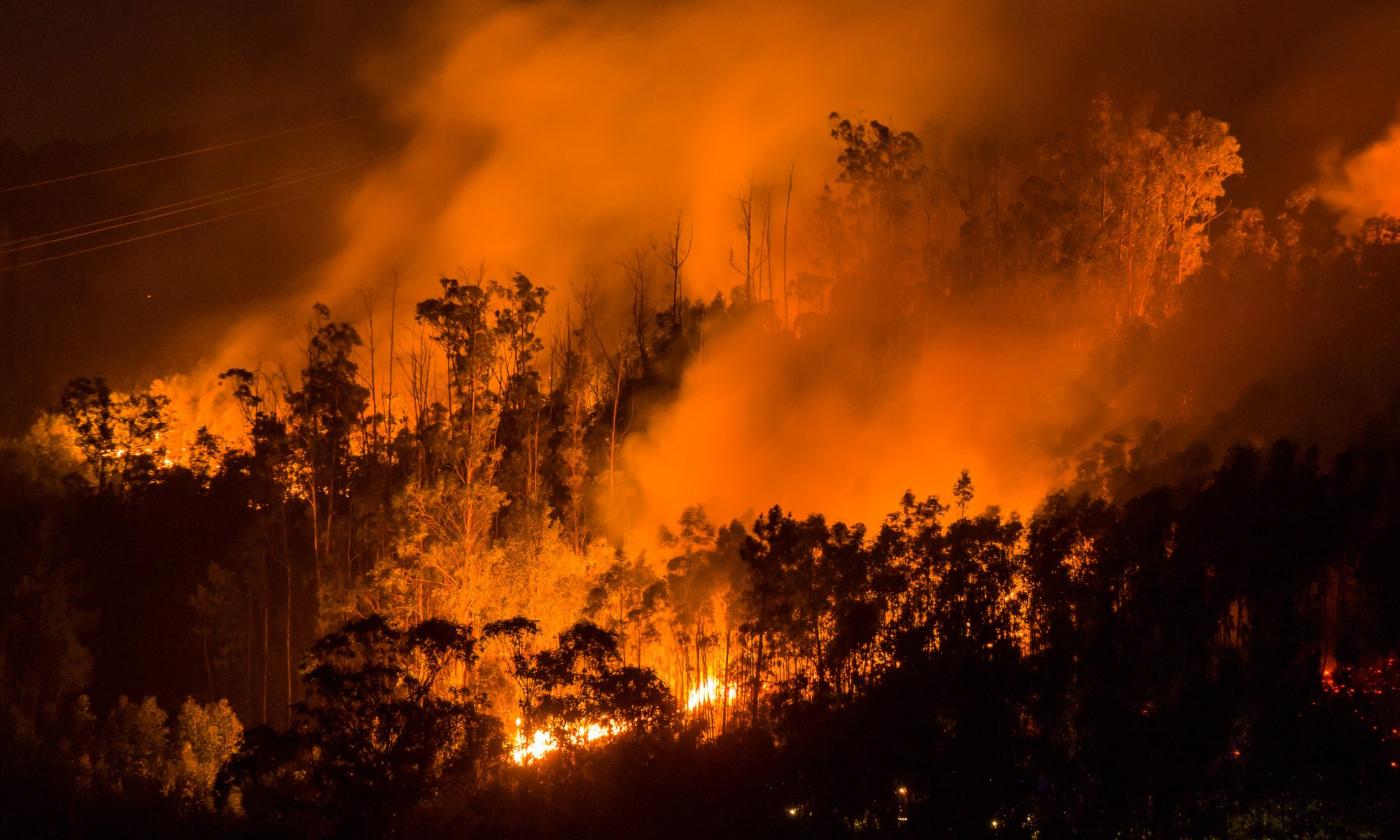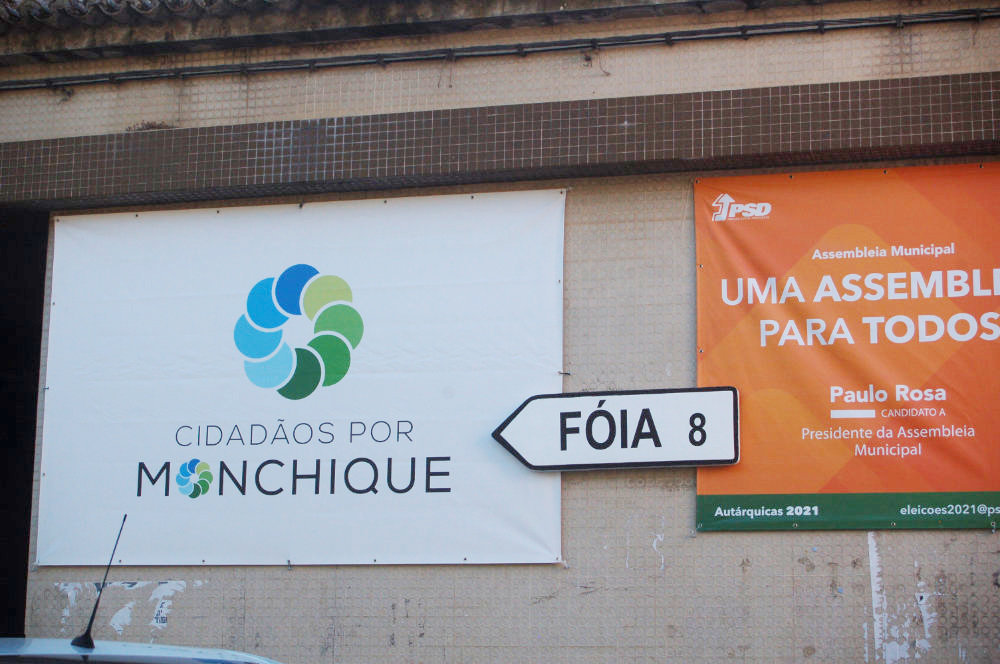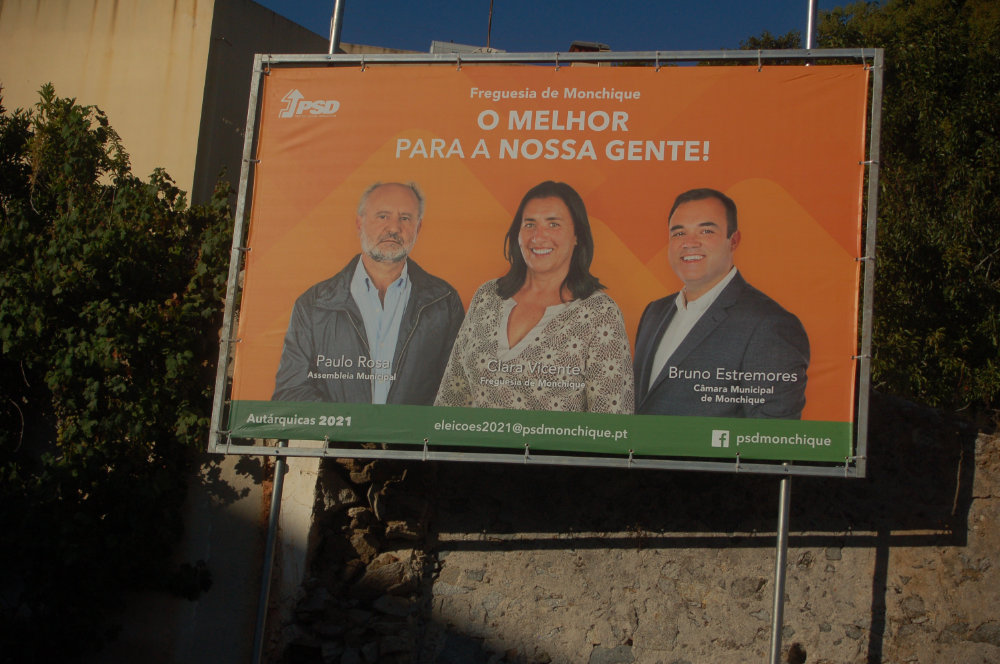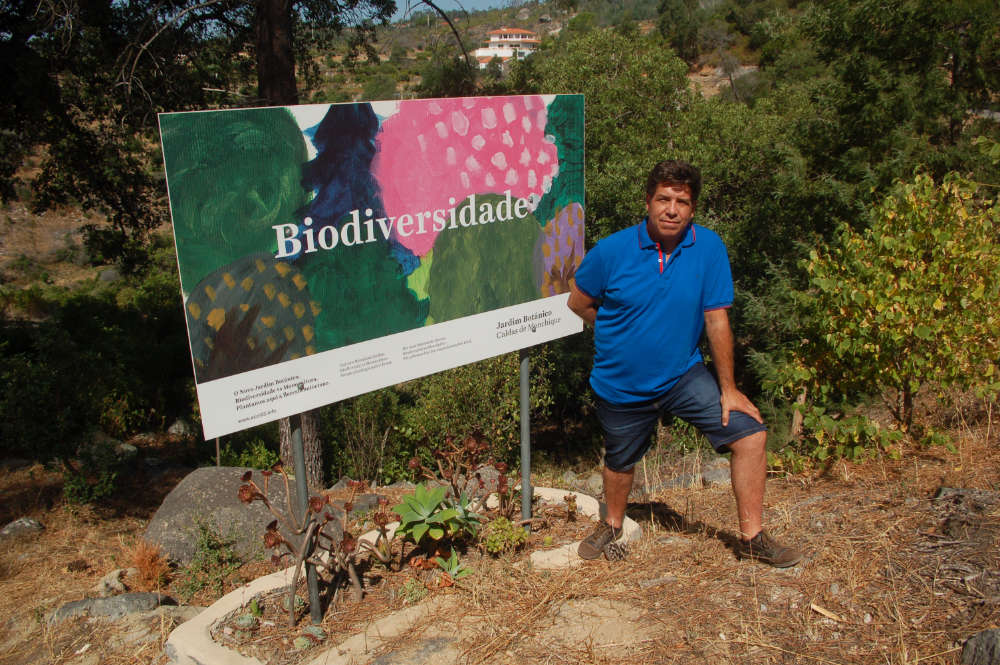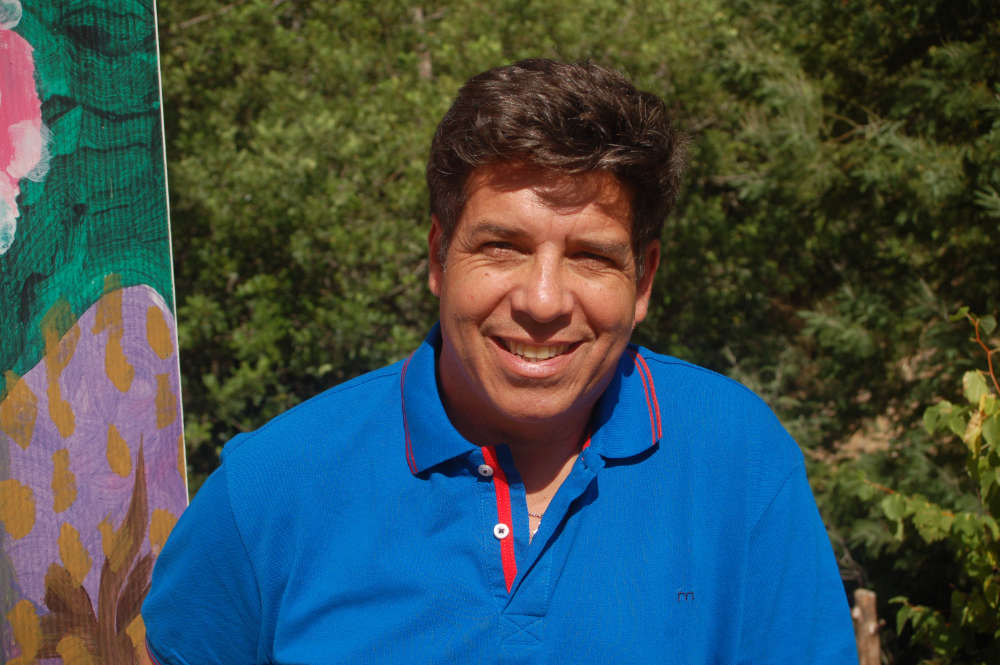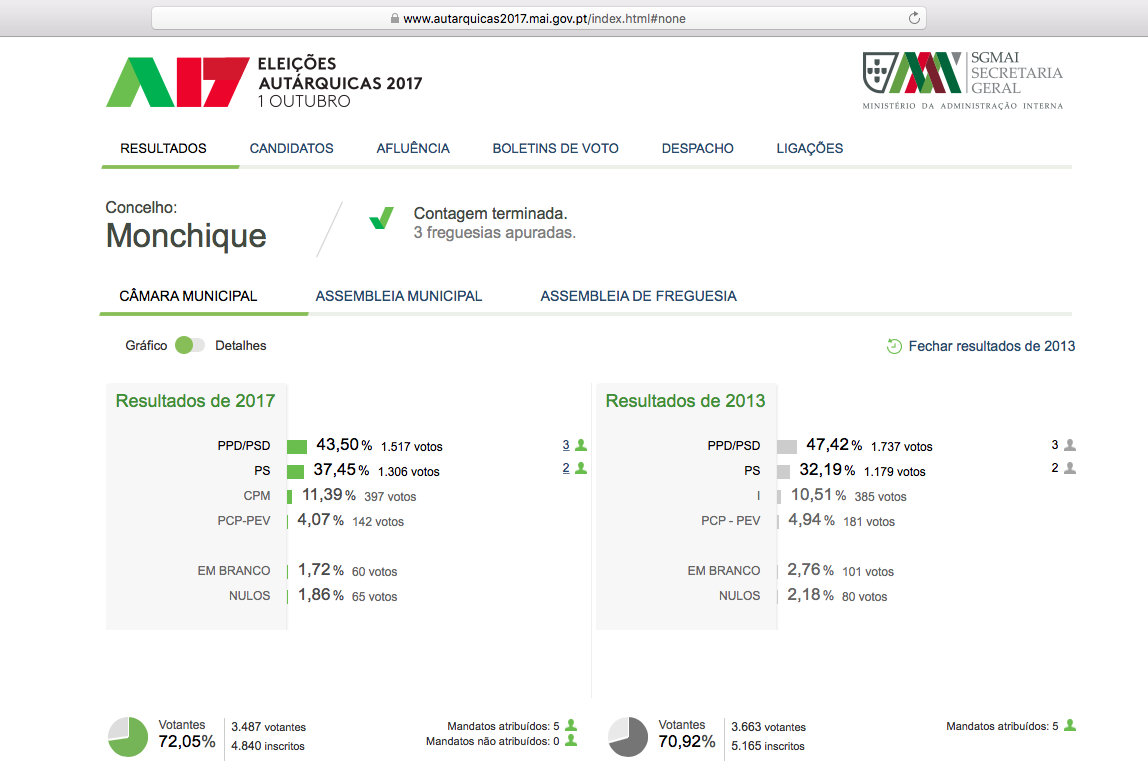Men Only, is it?
By Uwe Heitkamp
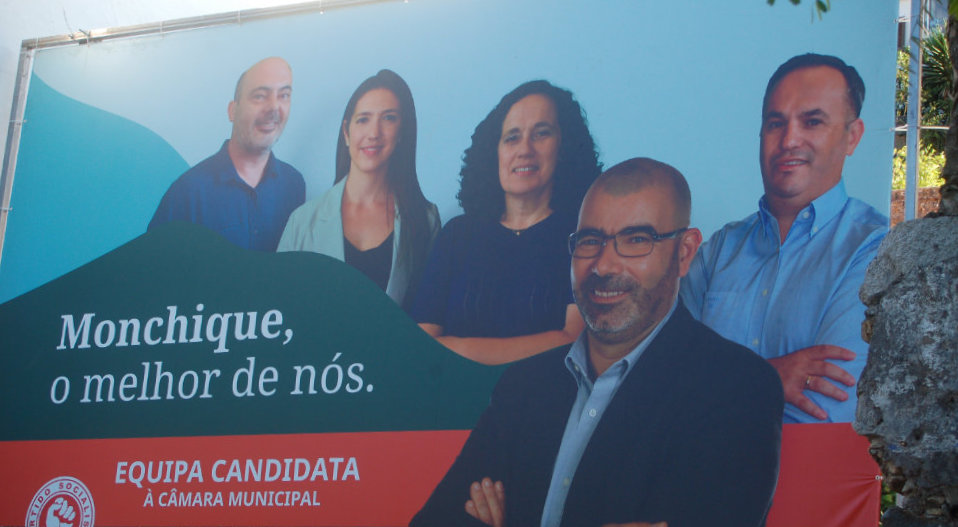 Not a single woman candidate in sight. Really, is it only men on these election posters? Over half of humanity isn’t standing in this election. This is just not on. I am observing the local elections with the eyes of a journalist, a foreigner from a EU country, not in Afghanistan, no, in Portugal. And what is being offered to me, dear Politics, in Monchique and many other communities across the country, is not the representative choice of female candidates I’d like to see.
Not a single woman candidate in sight. Really, is it only men on these election posters? Over half of humanity isn’t standing in this election. This is just not on. I am observing the local elections with the eyes of a journalist, a foreigner from a EU country, not in Afghanistan, no, in Portugal. And what is being offered to me, dear Politics, in Monchique and many other communities across the country, is not the representative choice of female candidates I’d like to see.
On top of that we have that guy from our new neo-fascist party called Chega, another man of course. For that one I’d only spare a few words, it’s very simple: Fuck you! Enough already. This specimen would like to see tougher punishments for arsonists in Portugal. Tie ‘em to a tree and burn ‘em. I’m satisfied with the letter of the law, if the laws were applied properly for once on the part of the judiciary. If an arsonist is sentenced to twelve years in the nick, they should have to spend the whole of those twelve years in there please, rather than planting their feet under mum’s table back home after only two, or four, or six years. A state based on vindictiveness has no future. The only future a body politic has is built on justice and fairness.
For someone like me, who would like to see true equality between men and women that means the electorate has a choice when they go to the voting table. That’s what I call justice. The electoral system was made by men however and doesn’t give us a true choice. For over half of humanity, women, aren’t even up for election. Why is that the case? I’ve interviewed five of the male candidates in Monchique and it seems to me that none of these five men is really 100 % qualified for this job of mayor. Or am I wrong? One more, the others a little less. Am I even allowed to say, to write this? Am I not neutral? Neutral? No, I’m not neutral, I am independent. I don’t belong to any party, which is why I examine everyone very carefully. No one can persuade me to make them look better than the others. Unfortunately none of them has a master plan for solving the biggest problem facing humanity: the forest fires, climate change. No one really wants to grab hold of the hot potato and solve the problem. A woman might have a better approach there. She would be more independent in her decisions. Women in Portugal have better qualifications and a reputation for being courageous politicians. For this is not only about tough decisions, it’s also about communicating these decisions to the voting public.
Rural exodus
Should Monchique become climate-neutral and if so, how? How do the gentlemen intend to stop these catastrophic forest fires? I put this question to every candidate and the answers were – to put it in the smallest of nutshells – disappointing. One said he would like to solve the problem by, in my humble opinion, putting the cart in front of the „Monchique“ horse. These kind of animals are tricky to ride without a saddle, but it’s possible if you learn it. One has to learn to make do with what one has. Well, yes, the rural exodus …
First the candidates want to repopulate Monchique. What to do however if nobody wants to move to Monchique from where they are because people know that it always burns here? And while we’re at it, why does it always burn in Monchique? Are there qualified jobs in Monchique? Does Tesla have a factory in Monchique? Is solar or wind energy being produced and sold right here? Is IT a leading industry in Monchique? This is surely the main rub, the lack of attractive employment options, paying solid salaries. Let’s dig up the problem, dissect it and take a closer look at possible solutions. Why does it always burn in Monchique? Do we have to ban people from owning matches? Do we have to find solutions for the dissatisfied, those left behind, the arsonists and the careless, if we are dealing with politics? Yes, definitely. We have to become part of the solution. And we have to examine the reasons why Monchique burns every few years.
In 2018 the problem was a blend of negligence on the part of the EDP and incompetence on the part of the Civil Protection service and the firefighting services who didn’t keep an already extinguished forest fire under close observation. When the wind changed direction, the fire reignited. This is about demystifying fire and forest fires, to analyse exactly how a fire starts, why it was impossible to put out this particular one and what is needed to fight forest fires of this and other kinds more professionally in the future. And this is also about minimising risk, investing in prevention, in the know-how and capability of the population to be able to immediately extinguish a fire within the first 15 minutes – before it is spread by the wind. Naturally the eucalyptus monocultures are a decisive factor in the burnability of the forest in Monchique. Eucalyptus is a kind of tree that draws moisture out of the soil, that transforms water to oil which burns exceedingly well. What do we mean if we are talking about forestry? Mixed forests, managed in a sustainable and exemplary fashion? Or do we view the forest as a self-service store where we see trees as industrial wood, carving out for ourselves what IKEA or The Navigator Company need to feed their machines?
Evidently the cane still occupies an honourable position in Portuguese daily life. That too will have to change. You threaten children and adults, and animals too, with a cane and – solve nothing. Threats sow fear. It’s been burning in Portugal for many years. And the governments, regardless of their political colour, have never questioned their concept of threatening punishment. The order given – keep your plot of land clean, cut down all trees within a radius of 50 metres around your house, clean the undergrowth, or you’ll be hit with a juicy fine – doesn’t impress anybody any more nor does it motivate anyone to cultivate their fallow land. Salazar is dead. António Costa too should know that by now. And people are moving from the countryside into the city. Why is that?
Because they are hoping for a better life there. I’ve been asking myself for a long time why we don’t breathe more life into our democracy? This also involves sharing power with women in places where men haven’t brought about solutions in many years. Indira Ghandi in India, Rute Silva in Vila do Bispo, Rosa Palma in Silves and Isilda Gomes in Portimão are living proof of the fact that solutions to human-made problems, from wars through a pandemic to climate change exist, if one wants to truly solve the problems.
Forest fires are solved with your head screwed on the right way, with intelligent and courageous investments in the system-relevant firefighting services – and with permanent checks by independent non-corrupt auditors. And a more female approach doesn’t punish negative environmental actions – but does reward good solution-focussed ones. Making the unimaginable imaginable. By now, forest fires are such a gigantic issue that they’ll have to be tackled with the ‘bazooka’ (Ursula von der Leyen) rather than with the shotgun of a local wild boar hunter. Let’s imagine the fire service in Monchique didn’t exist just in Monchique town, but also in Marmelete, 20 km away and in Alferce, eight kilometres away, as well as in some other far-flung hamlets such as Selão and Caldas, Tojeiro and Portela da Viuva, Perna da Negra and Fornalha. Take a proper amount of money, invest it in the improvement of the fire services, and decentralise them so they can get to the places where the forest fires start faster, and put them out. Also in order to show the importance we attach to the fire services in a democratic state. Four fire engines to fight forest fires across 400 km² will never be enough, but 40 vehicles and many well equipped and fairly remunerated teams you’ll have a solid foundation. These days, the profession of the female fire fighter is one of the most important ones there are. They protect the environment and humanity from climate change. When you and I go to bed at night they are protecting us by putting out fires and standing guard.
For three years, the former mayor of Monchique, the PSD’s Rui André, has given the victims of the gigantic forest fire of 2018 the runaround. Having promised a lot of compensation he didn’t comply with any of it. Not a single one of the 61 destroyed houses owned by families with primary residence has been rebuilt, nor are the 50 houses of the affected parties with second residence that burned down being rebuilt, unless the self-help associations obtain compensation for them in court. The mayor did not even join the criminal case against the alleged arsonist, the way it would behove any responsible politician. Those who practise this kind of politics of promises mustn’t be surprised if disappointed citizens join the ranks of Chega. Rui André didn’t even bother to tot up the damages, and has dragged his feet on the PDM master plan for over 12 years. Now those who can’t be bothered to put together damage inventories aren’t much bothered about the settlements of claims. A fundamental solution would be to adopt a law in Parliament that houses have to be insured against fire, storms and earthquakes before receiving a licence for habitation. In today’s ECO123 interview it’s the turn of João Duarte to present the ideas of his independent Cidadãos para Monchique on the issues of forest fires and climate change, and what they are planning to do about them.
Interview mit João Duarte CPM
My name is João Duarte, I’m 48, born and bred in Monchique, where I still live. I’m married with two kids, and my background is in Mechanical Engineering.
ECO 123: Why did you decide to stand for mayor of Monchique?
João Duarte: For nearly 20 years now we’ve been witnessing the degradation of our municipality, while we are not seeing our politicians and citizens coming together. My vision is along more professional lines; I believe that we have to change the way we view our municipality. We have great potential in terms of our natural heritage which is not being appreciated properly. We need to put together a good team with good people to renovate our municipality, to make the necessary improvements happen.
This leads us to the Citizens’ Movement for Monchique (Movimento Cidadãos para Monchique). What does your manifesto look like?
Our movement was founded eight years ago, at a time when we stood for the first time against the now-outgoing mayor. We didn’t believe in his promises – and policies – for over 12 years he deceived nearly the whole population. Our promises, made four years ago, are completely up-to-date, but now we have do place more emphasis on the reconstruction of the road network, on housing and on creating sustainable jobs related to Nature.
In August 2018, a fire razed practically the entire countryside in Monchique, Alferce, Esgravatadouro, Caldas, up to the municipalities of Silves and Portimão. Which means does your Movement have at hand to stop the fires?
The fires of 2018 affected us all terribly. We have ideas related to the construction of housing that would be resilient against fires. We also have projects and ideas for the restructuring and reorganization of the forest habitat. For this we need to hear the opinion of everybody connected with the forest, to be able to build a credible project to guard against fires.
Nearly 20% of the municipality was affected. Over 750 farmers lost crops and woodlands, 61 primary residences, 50 secondary residences. Up to now no one has received any compensation, at all. Do you not consider it important to resolve this situation before starting to engage in politics?
If we had the opportunity to lead our municipality it’s a question of investigating what happened, working directly with the people affected because this is an untenable situation. The Council should be the first official body to provide support and unblock the situations so affected parties may receive the help to rebuild or restore their houses. Housing policy should be reviewed. These policies are thought up at national level, without taking into account the topography for instance, the type of land, the living conditions, people’s way of life. New projects should include sprinklers on top of houses, as well as different woodland species around the houses, amongst other things.
Can you imagine how people feel?
Of course I can. Now we have to try and gain leadership, get to the people and see what they really need.
This is a great inheritance left by Rui André.
A great inheritance in the negative sense; there is a lot of work to be done. For 12 years there was a lack of preventative and corrective maintenance, which is why our municipality is in the state it’s in. When something was broken, Rui André opted for removal, instead of repair. Here we are on the Esgravatadouro road and we know the state it’s in, completely dilapidated, through simple lack of maintenance. People may criticise Carlos Tuta for not leaving us pretty roads, but he did leave them asphalted.
It’s not always about the money even. The first step for those affected by the fires could lie in reconciliation. Because if we carry on making politics as if nothing had happened where does that leave the people?
This has been going on for three years… it’s a letdown.
Another party running for municipal office is Chega.
It’s normal that these parties will emerge. People are unhappy and the Government has been led by the PS and PSD who have practically done nothing to help the population. What we have seen within the town council is a party makes a proposal, the other party actually agrees but abstains or votes against because it’s a political veto, and this works against the population. The only way to unite people and to work as a collective is with independent movements. The more people join our movement the better the path we can take.
Eucalyptus, a species that burns well and that enjoys burning, occupies 80% of Monchique’s forest cover. What is the solution?
This is a species that has increased, through the option of land owners exposed to pressure from the companies involved in paper pulp production, such as Navigator, amongst others. If we have a plot of land and plant eucalyptus we will see a profit at the end of nine years, but if we plant medronheiros, at the end of maybe five years we’ll already start seeing some profit. Beyond rentability this about the creation of jobs, the processing… because what makes people money is transformation of raw materials. Maybe there is land in the municipality that isn’t suitable for anything else, but in others … eucalyptus should be the last resort.
The 2018 some of the fire passed next to forests managed by these large cellulose companies and didn’t burn. It’s a question of management. And we have to create transformation in Monchique. We may back the cultivation of lemons, turning them into liqueur, ice-cream…, medronho, cork. It is the step from primary sector to secondary sector, processing, that will earn money and create economic potential.
What are the main concerns of the Movement?
We need to focus on the improvement of the roads. For someone like me who drives to Loulé every day, there’s others who drive to Portimão or Silves… We need to create conditions for Monchique to be a good place to live, surrounded by Nature. A place for a child in an ATL after-school activity centre in Monchique costs less than half of one in Portimão!
School is an important issue. But Monchique schools are full of asbestos.
Schools have to be sustainable, environmentally friendly, and also include vocational training. We need carpenters, mechanics, plumbers, shoemakers and other kinds of professions because technical staff and technical training provide an added-value for the municipality and allow the creation of new jobs. That way we’ll give an opportunity to people to be entrepreneurs and build their own employment, family and house here in Monchique.
The refurbishment of the school roofs could involve recourse to wind and photovoltaic power. We have great potential to do all this.
I know because at home I have a clean system of photovoltaic power.
I’ve worked successfully to reduce my ecologic footprint and the one of my family. We installed our three panels producing photovoltaic energy in 2008. When the first incentive was launched I embraced that decision straight away. And I have a jeep that is powered by vegetable oil. Up until the 2018 fire I recycled kitchen oils and used them in my own vehicle. If we read a bit around the history of Rudolf Diesel, we realise why he built a diesel motor. He did it so farmers could have a tool to work their land with an easily accessible fuel that could be harnessed from oleaginous plants. And an oleaginous plant when it’s growing and developing its own fruit it’s removing CO2 from the atmosphere, renewing it. In terms of a cyclical system, it represents zero.
… are you thinking of buying an electric car?
Later, when technology is a bit more evolved, yes. If I can manage to charge my batteries with energy from my panels that will be half the way there. But the fact 47% of our energy in this country is still coming from fossil sources, makes me hesitate. It also has to do with the exploration of the raw materials for the production of the batteries.
We could transform Monchique into a Zero Emissions municipality. Where to start?
With energy production and in public lighting. Half of the street lamps could be fed by photovoltaic power, substantially reducing the amount of money we pay the EDP. And we have the Moinho do Poucachinho, amongst other mills, which are part of the municipality’s heritage – and which should be opened to the public – but to which we could attach small hydro-energy units. This has to be a path built with speed and intelligence.
We have to change. But we shouldn’t do it out of necessity. We should do it through intelligence and for the ambition we have for our town. We have an idea for the optimisation, maintenance and regulation of the municipal infrastructures. We don’t actually consider the Serração sawmill, which is next to the cemetery, to be the ideal localisation for an events space.
Here in Monchique we don’t even have a space to enjoy cultural events …
I can suggest some ideas …
Would you like to make some promises?
No. Our goals are already outlined; what we promise is hard work and dedication. Within the arena of the arts, culture and education, the idea that we have come to develop is the one we presented four years ago to the population. It involves moving the firefighters from the centre of town to the armazéns municipais where we currently park and effect the maintenance and refuelling of the council fleet. While the current building doesn’t have a proper point of entry and exit for vehicles, that space offers the possibility to create favourable conditions; access to Alferce, Marmelete and Portimão, Foia and the Estrada de Saboia road would also be possible without the congestion inside the town, and faster.
There are no plans to build a base in Marmelete, Casais or Alferce?
We need small units. Small reservoirs in strategic places will be equally useful, allowing access to helicopters. And if we changed the type of construction, considering a small water reserve and sprinklers on top of the roof, that would give the firefighters more time to get to a fire.
We would also like to remove the heliport from its current site. This was a provisional construction in Carlos Tuta’s time on a site that was reserved for events, fairs, in the heart of the town. The armazéns municipais I mentioned would move to the business park, to be built over time, outside the town. The ideal place would be the Nave hamlet. It’s on a plain, with two roads, good access, a stream; the Ribeira das Canas road, which needs to be improved, repaired, widened, to create a quick access road for Portimão, the A22, allowing us to remove heavy-duty vehicles transporting goods from our scenic road. That road would be used by tourism, cycling and other leisure activities. Over the first four years we can lay the foundations of these projects, listen to the people, get their opinion. Do they think that this is the path we should take together? It will be important to hear their priorities.
You will most certainly talk about the Health Centre.
We need to create conditions for all residents to have a family doctor. Council monies are available for the Universidade do Algarve to fund the training of doctors, and we need to be the first to demand that after their training these professionals complete their specialisations and placements in the municipalities facing the most difficulties.
The Centro de Saúde Centre has terrible conditions. We know it’s difficult to incentivise doctors to move to inland regions, but if we could offer a different kind of municipality, with better institutions and better access, they will come, also because they already enjoy coming here to lunch, to taste the medronho, to enjoy nature …
Someone who trained as a fighter pilot with the Air Force stays attached to the institution for a certain number of years. If the training costs are shouldered by all taxpayers, why not stay for a certain time period (equivalent to the costs of the training) attached to public service and in the municipalities who need them most? This law is one that needs to be reviewed.
Four years ago we didn’t have the financial means to get our message to the people. We are an independent movement and the resources for our campaign come from our team.
How many people make up the CPM?
There are thirty of us.
People from Monchique…
Also from other places. We tried to run for Marmelete and Alferce, but owing to the change in policies on the part of the PS and PSD to harm the candidatures of the independent movements, we were only able to form our group after the law was revoked, one month and two weeks ago. Four years ago, when we started, we commented in February: “we’re starting late”, this year we started in June, even later. But we’re not letting up. We won’t receive subsidies nor support from any political party, that way we’ll value more our money and the money of our population.
What could change in Monchique if the Movement was elected?
The first thing to change is the attitude. The basis for everything is for us to know how to listen to people, call on those who have constructive criticism to offer to help us. Critical people bring added-value. They criticise because they like to see things change, and change for the better. When a politician starts surrounding themselves with “yes men”, it’s the people that pay the price. Our municipality has not developed and remains stuck in a difficult situation in many ways. It’s enough to change the attitude towards the management of municipal government and use common sense to build a healthy, sustainable and environmentally-friendly municipality. An independent movement is able to create consensus, outline new ways and to get the work done much faster.
Thanks for talking to us.
